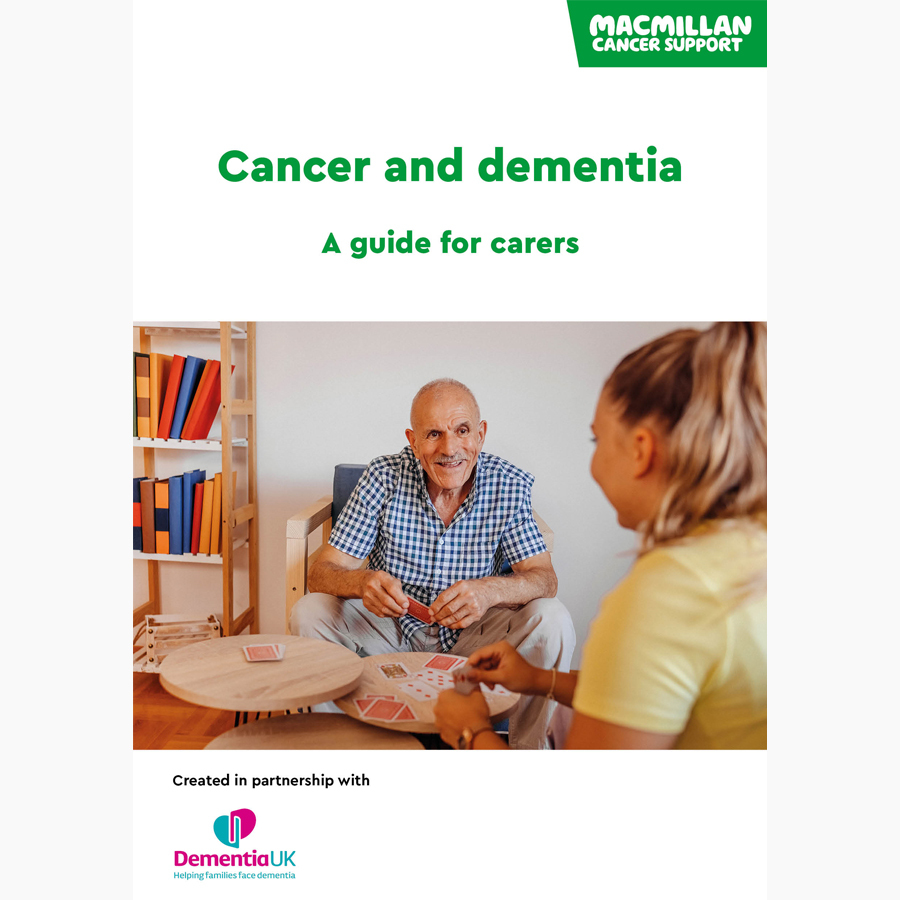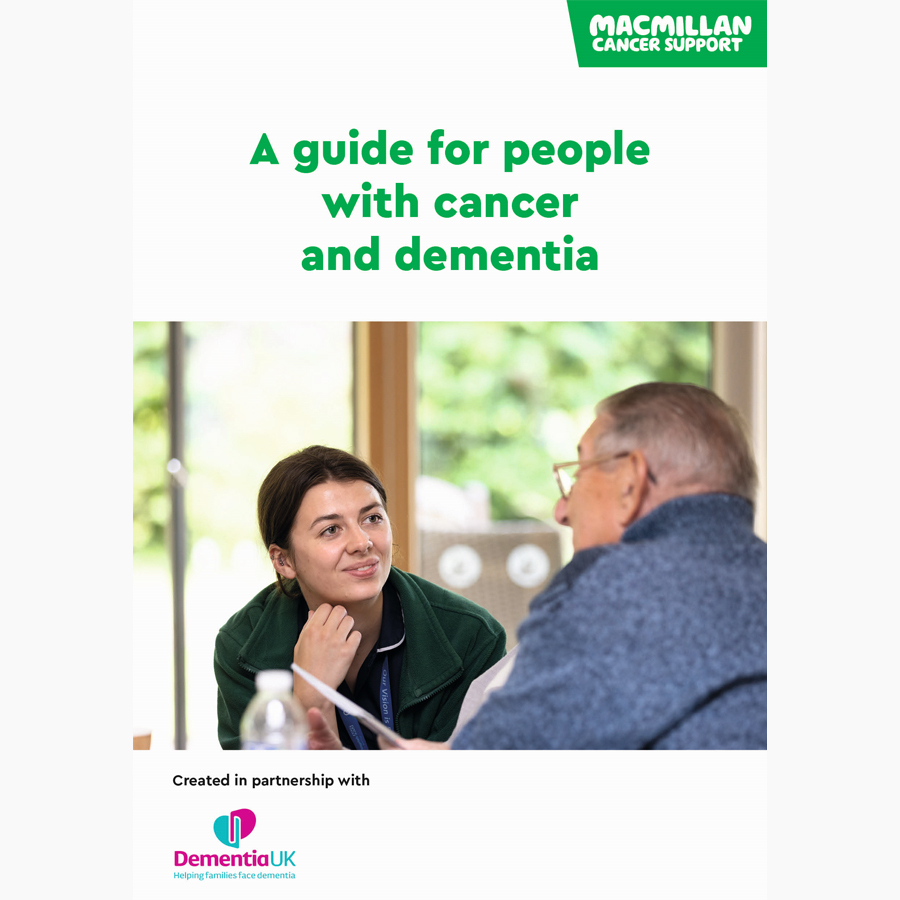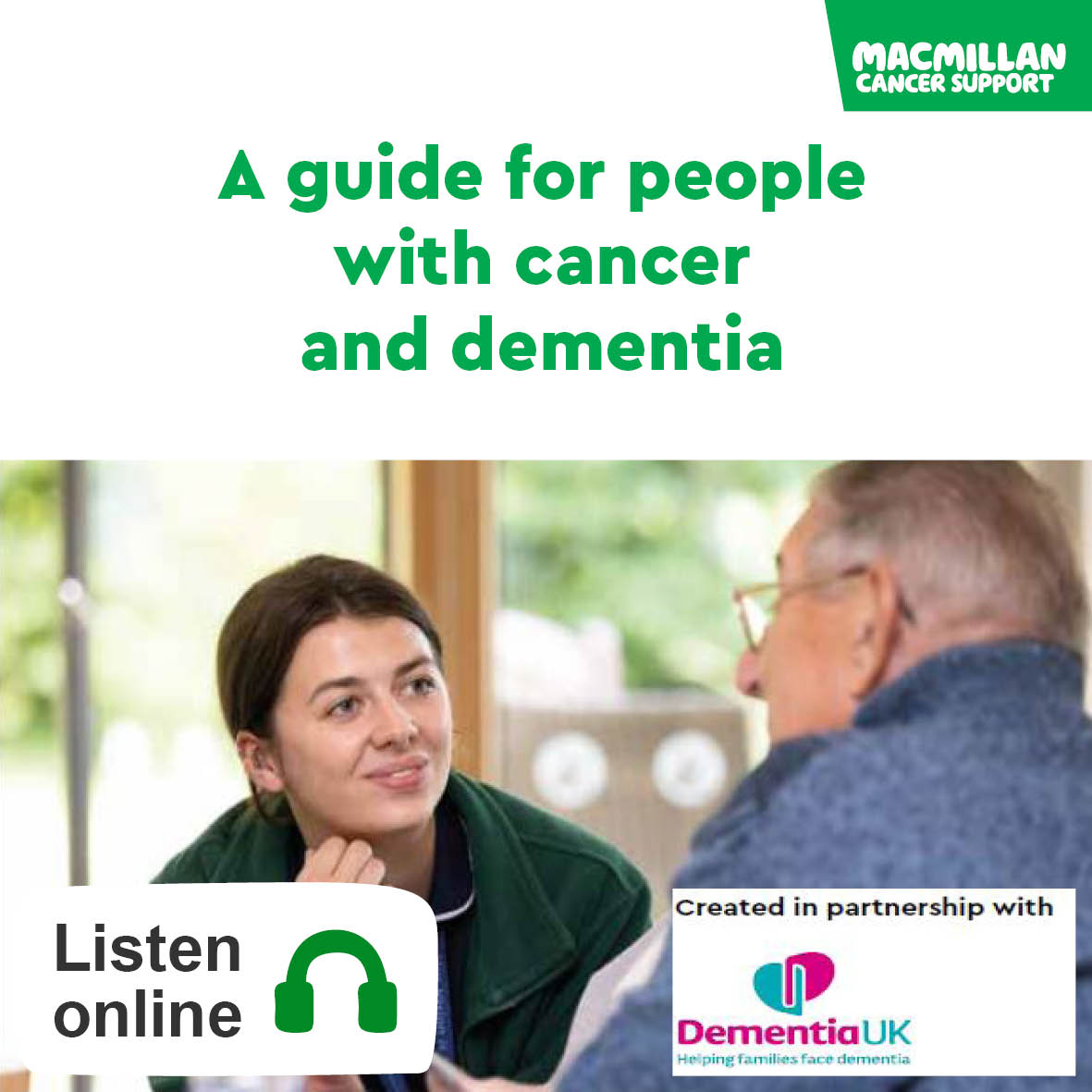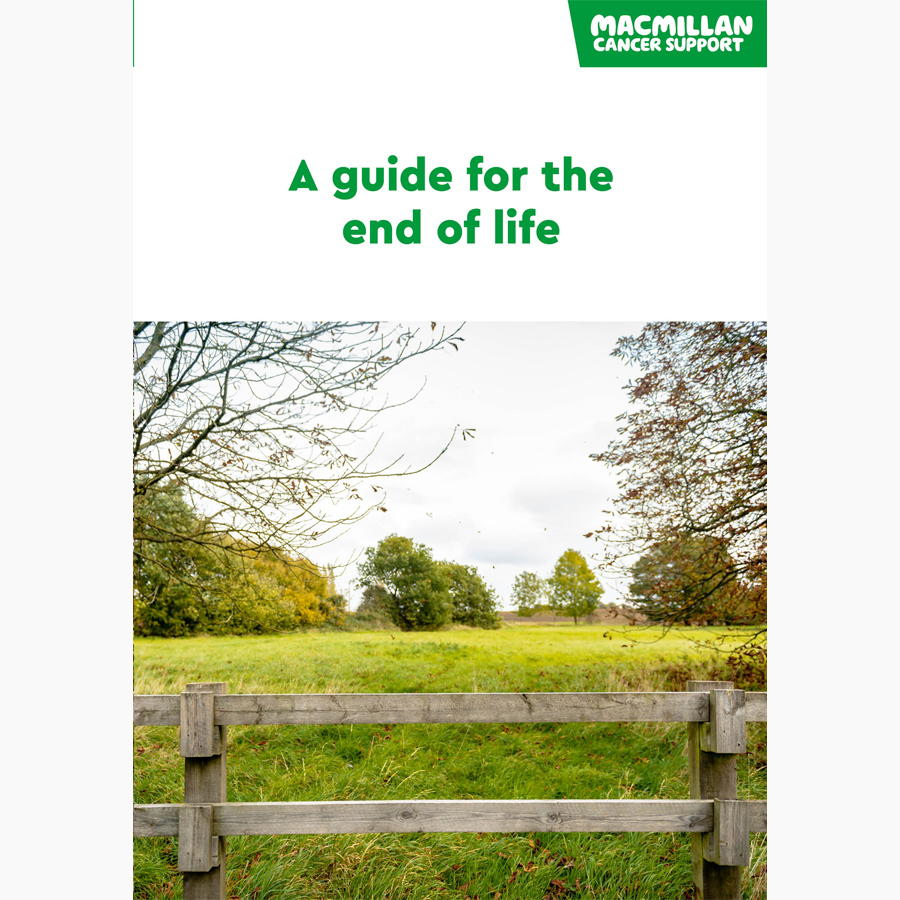Cancer and dementia
Find out more about supporting someone who has cancer and dementia, including how to get help and support.
Supporting someone with cancer and dementia
Each year, about 375,000 people in the UK are diagnosed with cancer. And it is estimated that 944,000 people in the UK are living with dementia. Many people with dementia are also living with other health conditions, including cancer. In people aged 75 or older with cancer or dementia, 1 in 13 have both conditions (around 8%).
The main risk factor for both cancer and dementia is age. Dementia mainly affects people over 65. But it can also affect younger people. When symptoms of dementia develop before the age of 65, it is described as ‘young onset’.
Many people with dementia are cared for at home by a family member or friend. In the UK, about 700,000 people are unpaid carers of someone with dementia.
If you care for someone who has both cancer and dementia, it can be very difficult for you and the person you care for.
Booklets and resources
What is dementia?
Dementia is a word used to describe a range of conditions affecting the brain that get worse over time. There are several types of dementia, so each person affected may have different symptoms.
The most common types of dementia are:
- Alzheimer’s disease
- Vascular dementia
- Lewy body dementia
- Frontotemporal dementia
- Mixed dementia
Dementia is caused by damage to the brain. Symptoms will depend on what has caused the damage and what part of the brain is affected.
Symptoms can include:
- problems thinking clearly
- finding it hard to solve simple problems
- not remembering or using the right words
- being confused or disoriented
- changes to behaviour or personality.
Dementia is usually thought of in three different stages - early, middle and late. These stages are a guide to how dementia might develop over time. But dementia is different for each person and the stage will depend on different factors, including:
- the type of dementia
- the person’s general health
- the support available
- whether the person is having treatment for dementia.
Some people may not notice symptoms at first. Symptoms may come and go, while others may get worse over time (progressive). As the dementia moves into a later stage, someone with dementia may need help with everyday activities.
Sometimes the stages of dementia overlap. This may mean they need help with one type of task or activity, but can manage others on their own.
Some types of behaviour can be both challenging and distressing.
Dementia UK has more information and support for people affected by dementia.
Treatments for cancer and dementia
The main treatments for cancer are:
- surgery
- radiotherapy
- chemotherapy
- hormonal therapy
- targeted therapy
- immunotherapy.
The treatment depends on:
- the type of cancer
- where in the body the cancer started
- the size of the cancer
- whether the cancer has spread to other parts of the body
- the person’s general health
- any other conditions they have, such as dementia.
Cancer teams consider all these things when planning treatment. Some people may have a combination of treatments.
We have more information about treating cancer when someone has dementia.
Planning for the future
If someone has dementia, it is likely that their ability to make decisions (mental capacity) will be affected in the future. There may be a time when they are no longer able to make decisions or communicate easily.
The person you care for may already have an idea of how they would like to be treated at the end of their life. If they are able to plan ahead, it can help you and the healthcare professionals caring for them.
There are different ways the person you care for can plan ahead. This is sometimes known as advance care planning. Usually, this is a chance for them to make decisions about:
- their wishes and preferences for care (advance statements)
- whether there are any treatments they do not want to have (advance decisions or directives)
- whether they want to give other people the legal power to manage their affairs – for example, their health, money and property. This is called a power of attorney.
Dementia UK has more information about advance care planning.
If the person you care for identifies as LGBTQ+, this may have an impact on the treatment and care they would like to receive. Compassion in Dying’s guide Your treatment and care: Planning ahead for the LGBT community may be helpful.
Wishes and preferences for care (advance statements)
The person you care for can talk to you, or to someone else they trust, about how they would like to be cared for. They can also write down their wishes and preferences and share them with family members and healthcare professionals. This is called an advance statement.
Advance statements are not legally binding. But they must be considered when healthcare professionals make decisions about that person’s care.
There are different documents that can be used to record wishes and preferences. You can ask a doctor or nurse which documents to use.
Advance decisions and directives to refuse treatment
An advance decision to refuse treatment (ADRT) is sometimes known as an advance decision or advance directive. It is a decision about treatments the person you care for does not want to have. For example, they may decide that if their breathing stops, they do not want treatment to try to bring them back to life (resuscitate them). Or they may decide that if they are very ill and have an infection, they do not want to be given antibiotics.
If the person you care for refuses a treatment, they will still receive good care. They will still have medicines to help manage any symptoms.
Power of attorney
The person you care for can give 1 or more trusted people power of attorney. This is the legal power to make decisions on their behalf. There are different types of power of attorney.
-
Ordinary power of attorney
A person making an ordinary power of attorney must have mental capacity. This power of attorney is temporary and only used for a set time. For example, it could be used to make financial decisions when a person is on holiday or in hospital. Age UK has further information.
-
Lasting power of attorney (LPA)
There are 2 types of LPA. One relates to health and welfare. The other relates to property and finances. Someone can choose to make 1 type of LPA, or both. An LPA is a legal process set up before a person loses mental capacity. A person with dementia can state what they would like to happen in the future if they lose mental capacity. LPAs are permanent and are valid only in England and Wales. There is a different process in Scotland and Northern Ireland.
GOV.UK and Dementia UK have further information about LPAs.
Although someone can create their own power of attorney, it can help to speak to a solicitor. They will make sure it meets all the requirements of the law. If you do not have a solicitor, you can find one by contacting the Law Society.
We have more information on planning for the future. There are versions for:
We have more information about advance care planning.
Care options
It can be helpful for the person you care for to think ahead and make some decisions about where they want to be cared for in the future.
They may be able to stay at home with help and support. Or they can be cared for in a hospice or nursing home.
We have more information about short-term and long-term cancer and dementia care options.
Managing symptoms and side effects
The person you care for may have symptoms or side effects caused by cancer or cancer treatment. Some of these may be similar to the symptoms or side effects caused by dementia.
We have more information about symptoms and side effects in someone with cancer and dementia.
Related pages
Practical help
There are lots of everyday things you can do to help someone living with cancer and dementia.
You do not have to cope with caring for someone on your own. Building a support network of friends, family or neighbours can make a big difference.
There are also community health and social care professionals who can support you. The type and amount of support you get will depend on where you live and how the services are organised in your area.
If you need support and services to help you care for someone in their home, you can ask the GP and district nurses to make referrals.
If the person you care for is coming home from a stay in hospital, any help and services they need can be set up so that they start when the person gets home. The hospital staff usually does this, with the help of a social worker.
Health and social professionals that can help include:
-
Admiral Nurses
Admiral Nurses provide the specialist dementia support that families need. When things get challenging or difficult, Admiral Nurses work alongside people with dementia and their families to offer one-to-one support and expert guidance.
Admiral Nurses work in:
- local community services
- GP practices
- NHS hospitals
- care homes
- hospices.
They also run Dementia UK’s helpline, Closer to Home dementia clinics and virtual clinics.
-
Specialist nurses
Specialist nurses can give information about and support for certain diseases, such as cancer or dementia. Most specialist nurses work in NHS hospitals or in the community.
Specialist nurses do not usually provide nursing care. But they will:
- assess needs
- give advice
- help people understand their treatment options.
Many Macmillan professionals are nurses who have specialist knowledge of a certain type of cancer. You may meet them if you attend clinic or hospital appointments with the person you care for.
-
GPs
A GP looks after people who are unwell and being cared for at home. They will assess the person you care for. They can refer the person to other services, for example, community mental health services, occupational therapists or physiotherapists.
If needed, they can help arrange for the person you care for to go into a hospital, nursing home or hospice.
-
District nurses
District nurses work closely with GPs. They can give advice and support to people by visiting them at home.
-
Social workers
A social worker is responsible for assessing what practical and social help the person you care for needs. They are sometimes called a care manager.
If the person does not already have a social worker, the GP, nurse or hospital staff can arrange a referral. Or you could contact the local social services department. You can find them online under the name of your:
- local authority
- council
- health and social care trust.
Each local authority does its own tests to decide what help they can offer. This means the services offered will vary from area to area.
The social worker can also do an assessment of your needs as a carer. This is called a carer’s assessment.
-
Physiotherapists
A physiotherapist can help if the person you care for is unsteady on their feet or needs help moving around. They give help and advice on exercises and ways to keep the person as mobile as possible. You could ask their GP or specialist nurse for a referral.
-
Occupational therapists
Occupational therapists can provide information, support and aids to help people to manage their everyday activities. They can provide support with rehabilitation and memory loss as well as helping to adapt the person’s environment.
-
Dietitians
Dietitians are qualified healthcare professionals who give specific advice to people with eating, dietary or weight problems. They also give advice on healthy eating in general. Some dietitians have specific training in helping people affected by cancer.
-
Speech and language therapists
Speech and language therapists (SLTs) treat and support people who have problems communicating, eating and drinking.
-
Specialist continence nurses
People with dementia may already have problems controlling their bladder and bowels (incontinence). Some cancer treatments may make this worse. The person you care for can be referred to a specialist continence nurse. Continence nurses carry out assessments and support people with ways to manage incontinence. You can ask the GP, specialist cancer nurse or practice nurse of the person you care for to refer them.
Help at home
The person you care for may be able to get help in the home. This can support them to stay independent and in their own home. It can also give you a break from caring.
Care attendants, carers or personal assistants come to the home to help. The support and services available are different across the UK. The type of help they give may include:
- personal care, such as washing and dressing
- doing some jobs around the house
- staying with the person so you can have a break.
You usually have to pay towards the cost of services. The person’s GP or social worker can talk to you more about this. They can also let you know what help is available in your area.
Voluntary organisations and charities
Voluntary organisations and charities offer various kinds of help. This may include:
- information
- loans of equipment
- grants
- transport
- help with filling out forms or making telephone calls to get relevant support.
Some organisations have volunteers who offer short periods of respite care to give you a break during the day. Others, including Marie Curie and Age UK, provide befriending services for people who are on their own.
The district nurse, specialist nurse or GP will be able to tell you about the types of help and support available in your area.
Related pages
Caring for someone with advanced cancer
If the person has recorded their preferences for future care, this can help you and the person’s care team make decisions about what might be best for them at this stage. For example, this may include how and where they would prefer to be cared for, or the things that are important to them.
Palliative Care
For some people, it may not be possible to control the cancer any longer. Or they may not be well enough to have treatment. If this happens, their cancer doctor or specialist nurse will make sure they have treatment to manage their symptoms. This is called palliative care.
Some people may already be having palliative care when they are diagnosed with cancer and dementia. Others may be referred to a palliative care team at a later stage. The person you care for can be referred for palliative care by their cancer doctor, GP or specialist nurse.
Community specialist palliative care teams
Palliative care teams include specialist nurses and doctors. These teams specialise in controlling pain and symptoms, as well as offering emotional support. They are sometimes based in hospices and can visit people who are being cared for at home.
Community specialist palliative care nurses will work closely with the person’s GP, district nurse and other hospital services. They will tell you more about their services, how to contact them and when they are available.
End of life
Learning that the person you care for may be near the end of their life can be very difficult and distressing. You may experience strong emotions. You may need some time on your own. Or you might want to talk things through with your partner, a relative or a close friend.
Some people find it easier to talk to someone outside their family. If you think this would be helpful, you can talk to your doctor. They may be able to refer you to a counsellor. Or you can contact the British Association of Counselling and Psychotherapy. They have information about counsellors in different areas and charities that may offer free or discounted counselling.
We have more information about coping at the end of life. It is meant for people in the final stages of life, and their carers.
Dementia UK also has information about understanding the changes in dementia and end of life care. You could also contact the Dementia UK Admiral Nurse Helpline for support and advice.
Booklets and resources
Being a carer
You are a carer if you give any unpaid help and support to someone who could not manage without your help. It can include:
- emotional support
- help with daily tasks
- driving them to appointments
- helping with personal care, such as bathing and dressing.
Looking after yourself
It is important to look after yourself as well as the person you care for. Taking the time to focus on your own health and well-being will also benefit the person you care for. For example, doing something you enjoy such as reading or going for a walk may help you feel less stressed.
Looking after someone with cancer and dementia can be rewarding. But the physical and emotional demands can be difficult. You may have a lot of different emotions. Getting support and having someone to talk to about how you feel might help you cope.
Dementia UK has more information to support carers with the issues they have to deal with when looking after a person with dementia.
We also have more practical information and advice about looking after someone with cancer, which you may find useful.
Talk about your feelings
Finding out the person you care for has both cancer and dementia can be very upsetting. It is common to feel shocked, frightened or angry about their situation.
Talking to other people about how you feel can be helpful.
Some people find it hard to talk to family and friends. Ask your GP to refer you to a counsellor or support group. Or the cancer team may be able to refer you to support at hospital.
If you need more support, you can call the Macmillan Support Line. Or you can call Dementia UK’s Admiral Nurse Dementia Helpline.
Support from other carers
Many people find it helpful to share their caring experience with someone in the same situation. If you feel this way, there are groups, organisations and healthcare professionals that can help you.
Online support groups or chat rooms
On our Online Community, you can chat anonymously to other people looking after someone with cancer.
The Alzheimer’s Society also has an online forum just for those caring for someone with cancer and dementia.
Our cancer support specialists can help you find out what is available in your area.
You can also get information and advice from Carers UK or Carers Trust.
Financial help and benefits
Looking after someone with cancer and dementia often means extra costs for you and the person you care for. This can include paying for travel to hospital, or increased food or heating bills. If you have to stop working or reduce your hours, your income may drop.
You and the person you care for may be eligible for benefits. A range of benefits are available for full-time carers and carers who are still working.
You can speak to our money advisers for more information. Call us free on 0808 808 0000 or visit our financial support pages.
Dementia UK’s Admiral Nurses can also give financial advice to people affected by dementia.
About our information
This information has been written, revised and edited by Macmillan Cancer Support’s Cancer Information Development team. It has been reviewed by expert medical and health professionals and people living with cancer.
-
References
Below is a sample of the sources used in our cancer and dementia information. If you would like more information about the sources we use, please contact us at informationproductionteam@macmillan.org.uk
National Institute for Health and Care Excellence (NICE). Decision-making and mental capacity. NICE guideline [NG108]. Published 03 October 2018. Available from: www.nice.org.uk/guidance/ng108 [accessed June 2023].
Surr CA, Kelly R, Griffiths AW, Ashley L, Cowdell F, Henry A, et al. Enabling people with dementia to access and receive cancer treatment and care: the crucial role of supportive networks. Journal of Geriatric Oncology. 2020;11(7): 1125–1131. Available from: www.doi.org/10.1016/j.jgo.2020.03.015 [accessed July 2023].
Dr Chris Jones
Reviewer
Speciality Registrar in Clinical Oncologist and Clinical Lecturer in Clinical Oncology
Date reviewed

Our cancer information meets the PIF TICK quality mark.
This means it is easy to use, up-to-date and based on the latest evidence. Learn more about how we produce our information.
The language we use
We want everyone affected by cancer to feel our information is written for them.
We want our information to be as clear as possible. To do this, we try to:
- use plain English
- explain medical words
- use short sentences
- use illustrations to explain text
- structure the information clearly
- make sure important points are clear.
We use gender-inclusive language and talk to our readers as ‘you’ so that everyone feels included. Where clinically necessary we use the terms ‘men’ and ‘women’ or ‘male’ and ‘female’. For example, we do so when talking about parts of the body or mentioning statistics or research about who is affected.
You can read more about how we produce our information here.








